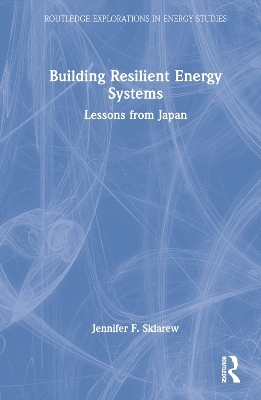
Building Resilient Energy Systems
Routledge (Verlag)
978-1-032-13087-3 (ISBN)
Jennifer F. Sklarew examines how two key factors – shocks and stakeholder relationships - combine to influence energy system transitions, applying a case study of Japan’s trajectory from the time of the 1970s oil crises through the period following the 2011 Fukushima Daiichi nuclear disaster. Examining the role of diverse stakeholders’ resilience priorities, she focuses on how changes in stakeholder cooperation and clout respond to and are affected by these shocks, and how this combination of shocks and relationship changes shapes energy policies and policymaking. From Japan’s narrative, the book derives unique and universal lessons for cooperation on innovation and energy system resilience applicable to communities and nations around the globe, including implications for transitions in the context of the COVID-19 pandemic. The book also places energy system resilience and innovation in the broader context of the food-energy-water-climate nexus.
Building Resilient Energy Systems: Lessons from Japan will appeal to all levels of readers with an interest in energy policy, energy technologies and energy transitions: experts and specialists; academics and students; practitioners and policymakers.
Jennifer F. Sklarew brings 30 years of energy policymaking and analysis to her research and teaching as a professor of energy and sustainability at George Mason University. National Public Radio (NPR) has quoted her as an expert on Japanese energy policymaking. In the U.S. Department of Commerce’s Office of Japan, she collaborated on Japanese electricity and gas deregulation and served as a Mike Mansfield Fellow in Tokyo. She previously served as an energy policy consultant to Japanese utility companies and a policy analyst for the Japan Nuclear Cycle Development Institute. Her broader food-energy-water-climate resilience interest appears in this book and a co-authored book, Managing Challenges for the Flint Water Crisis.
Acknowledgements List of Figures List of Tables List of Abbreviations 1. Introduction 2.Framing Concepts: Energy System Lock-in, Shocks, Stakeholders and Resilience 3.1970s-1980s Oil Shocks: Not So Shocking 4.1990s and 2000s Nuclear Accidents and Scandal: Shock Absorption 5. 2011-2020 Fukushima Disaster: Shock to the System or Not? 6. Conclusions: Lessons for Resilience and Innovation Index
| Erscheinungsdatum | 26.10.2022 |
|---|---|
| Reihe/Serie | Routledge Explorations in Energy Studies |
| Zusatzinfo | 6 Tables, black and white; 17 Line drawings, black and white; 3 Halftones, black and white; 20 Illustrations, black and white |
| Verlagsort | London |
| Sprache | englisch |
| Maße | 156 x 234 mm |
| Gewicht | 630 g |
| Themenwelt | Naturwissenschaften ► Biologie ► Ökologie / Naturschutz |
| Sozialwissenschaften ► Soziologie ► Spezielle Soziologien | |
| Technik ► Elektrotechnik / Energietechnik | |
| Wirtschaft ► Volkswirtschaftslehre | |
| ISBN-10 | 1-032-13087-3 / 1032130873 |
| ISBN-13 | 978-1-032-13087-3 / 9781032130873 |
| Zustand | Neuware |
| Haben Sie eine Frage zum Produkt? |
aus dem Bereich


